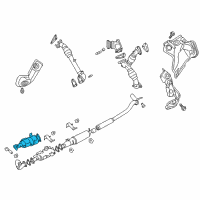- Department
- Brands
- Prices
OEM (Genuine) Converter Assembly-Diesel Particulate Filter
PartNumber: 208D2-EZ40B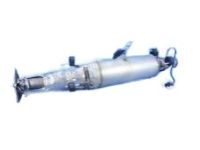 Product Specifications
Product Specifications- Other Names: Converter, Filter
- Item Dimensions: 27.0 x 45.2 x 54.6 inches
- Item Weight: 60.90 Pounds
- Fitment Type: Direct Replacement
- Replaces: 208D2-EZ40A
- Part Description: Converter Assembly-Diesel Particulate Filter
$3583.09 MSRP:$4331.54You Save: $748.45 (18%)OEM (Genuine) Exhaust Pipe
PartNumber: 18-30-8-583-372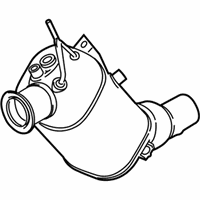 Product Specifications
Product Specifications- Item Weight: 14.70 Pounds
- Fitment Type: Direct Replacement
- Replaces: 18-30-8-515-092
- Part Description: Exhaust Pipe
$2218.53 MSRP:$2791.56You Save: $573.03 (21%)OEM (Genuine) Exhaust Pipe
PartNumber: 18-30-8-512-287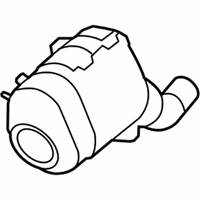 Product Specifications
Product Specifications- Other Names: Filter
- Item Weight: 12.20 Pounds
- Fitment Type: Direct Replacement
- Part Description: Exhaust Pipe
$3652.12 MSRP:$4601.65You Save: $949.53 (21%)OEM (Genuine) Catalytic Converter
PartNumber: 18-32-8-580-684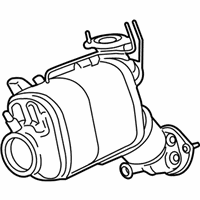 Product Specifications
Product Specifications- Other Names: Diesel Particulate Filter, Preconverter
- Fitment Type: Direct Replacement
- Part Description: Catalytic Converter
$2648.34 MSRP:$3329.29You Save: $680.95 (21%)OEM (Genuine) Catalytic Converter
PartNumber: 18-30-8-515-094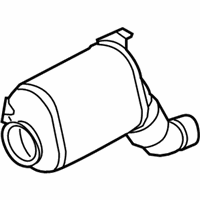 Product Specifications
Product Specifications- Other Names: Filter, Preconverter
- Item Weight: 14.00 Pounds
- Fitment Type: Direct Replacement
- Part Description: Catalytic Converter
$2522.77 MSRP:$3170.74You Save: $647.97 (21%)OEM (Genuine) Diesel Particulate Filter
PartNumber: LC3Z-5H270-A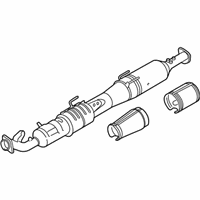 Product Specifications
Product Specifications- Other Names: Catalytic Converter, Diesel Particulate Filter
- Replaced by: LC3Z-5H270-F
- Part Description: Diesel Particulate Filter
$3447.77 MSRP:$4092.00You Save: $644.23 (16%)OEM (Genuine) Diesel Particulate Filter
PartNumber: LC3Z-5H270-G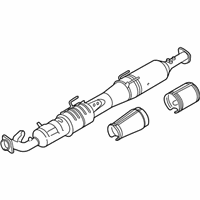 Product Specifications
Product Specifications- Other Names: Catalytic Converter, Diesel Particulate Filter
- Replaces: LC3Z-5H270-D
- Part Description: Diesel Particulate Filter
$3488.09 MSRP:$4140.00You Save: $651.91 (16%)OEM (Genuine) Exhaust Pipe
PartNumber: 18-30-8-512-290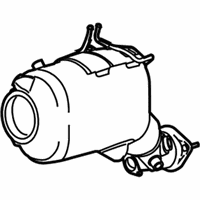 Product Specifications
Product Specifications- Other Names: Filter
- Item Weight: 12.20 Pounds
- Fitment Type: Direct Replacement
- Part Description: Exhaust Pipe
$3572.19 MSRP:$4243.54You Save: $671.35 (16%)OEM (Genuine) Center Muffler
PartNumber: 22739326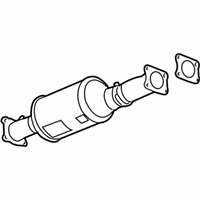 Product Specifications
Product Specifications- Other Names: Center Muffler, Diesel Particulate Filter
- Item Dimensions: 139.7 x 27.6 x 14.4 inches
- Item Weight: 33.80 Pounds
- Fitment Type: Direct Replacement
- Part Description: Center Muffler
$2095.60 MSRP:$3148.76You Save: $1053.16 (34%)OEM (Genuine) Muffler & Pipe
PartNumber: 22896370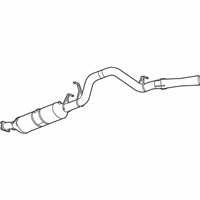 Product Specifications
Product Specifications- Item Dimensions: 120.4 x 28.9 x 18.1 inches
- Item Weight: 78.70 Pounds
- Fitment Type: Direct Replacement
- Replaces: 22754033
- Part Description: Muffler & Pipe
$2269.75 MSRP:$3411.48You Save: $1141.73 (34%)OEM (Genuine) Muffler & Pipe
PartNumber: 22896369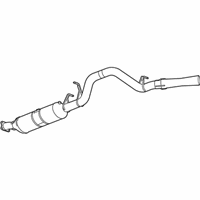 Product Specifications
Product Specifications- Other Names: Diesel Particulate Filter, Muffler & Pipe
- Item Dimensions: 126.7 x 31.9 x 18.1 inches
- Item Weight: 83.70 Pounds
- Fitment Type: Direct Replacement
- Replaces: 22754038
- Part Description: Muffler & Pipe
$2285.85 MSRP:$3435.77You Save: $1149.92 (34%)OEM (Genuine) Diesel Particulate Filter
PartNumber: JL3Z-5H270-A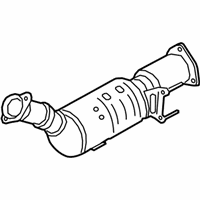 Product Specifications
Product Specifications- Other Names: Catalytic Converter, Diesel Particulate Filter
- Item Weight: 14.40 Pounds
- Fitment Type: Direct Replacement
- Part Description: Diesel Particulate Filter
$1885.75 MSRP:$2232.45You Save: $346.70 (16%)OEM (Genuine) Center Muffler
PartNumber: 22794610 Product Specifications
Product Specifications- Other Names: Center Muffler, Diesel Particulate Filter, Filter
- Item Dimensions: 115.5 x 33.0 x 15.7 inches
- Item Weight: 266.50 Pounds
- Fitment Type: Direct Replacement
- Replaces: 25820807
- Part Description: Center Muffler
$1848.88 MSRP:$2776.00You Save: $927.12 (34%)OEM (Genuine) Diesel Particulate Filter
PartNumber: 23106791 Product Specifications
Product Specifications- Other Names: Diesel Particulate Filter
- Item Dimensions: 198.3 x 29.5 x 12.1 inches
- Item Weight: 105.70 Pounds
- Fitment Type: Direct Replacement
- Part Description: Diesel Particulate Filter
$1713.29 MSRP:$2572.01You Save: $858.72 (34%)OEM (Genuine) Center Muffler
PartNumber: 23106793 Product Specifications
Product Specifications- Other Names: Center Muffler, Diesel Particulate Filter
- Item Dimensions: 139.7 x 28.1 x 15.0 inches
- Item Weight: 95.30 Pounds
- Fitment Type: Direct Replacement
- Part Description: Center Muffler
$1948.29 MSRP:$2926.54You Save: $978.25 (34%)OEM (Genuine) Center Muffler
PartNumber: 22739325 Product Specifications
Product Specifications- Other Names: Center Muffler, Diesel Particulate Filter
- Item Dimensions: 122.1 x 26.2 x 14.6 inches
- Item Weight: 73.30 Pounds
- Fitment Type: Direct Replacement
- Part Description: Center Muffler
$2628.86 MSRP:$3953.24You Save: $1324.38 (34%)OEM (Genuine) Diesel Particulate Filter
PartNumber: 23106790 Product Specifications
Product Specifications- Other Names: Diesel Particulate Filter
- Item Dimensions: 145.2 x 45.7 x 14.6 inches
- Item Weight: 99.60 Pounds
- Fitment Type: Direct Replacement
- Part Description: Diesel Particulate Filter
$2053.31 MSRP:$3084.97You Save: $1031.66 (34%)OEM (Genuine) Center Muffler
PartNumber: 23106794 Product Specifications
Product Specifications- Other Names: Center Muffler, Diesel Particulate Filter
- Item Dimensions: 124.4 x 26.8 x 14.9 inches
- Item Weight: 84.70 Pounds
- Fitment Type: Direct Replacement
- Part Description: Center Muffler
$2512.12 MSRP:$3777.12You Save: $1265.00 (34%)OEM (Genuine) Muffler & Pipe
PartNumber: 85165533 Product Specifications
Product Specifications- Other Names: Diesel Particulate Filter, Muffler & Pipe
- Replaces: 84181080
- Replaced by: 86534411
- Part Description: Muffler & Pipe
$2085.79 MSRP:$3133.96You Save: $1048.17 (34%)OEM (Genuine) NOX Catalytic Converter Assembly (W/ Fltr)
PartNumber: 12694479 Product Specifications
Product Specifications- Item Dimensions: 32.0 x 13.5 x 13.3 inches
- Item Weight: 40.20 Pounds
- Replaced by: 40009139
- Part Description: NOX Catalytic Converter Assembly (W/ Fltr)
$759.66 MSRP:$1133.13You Save: $373.47 (33%)OEM (Genuine) Diesel Particulate Filter
PartNumber: 12700216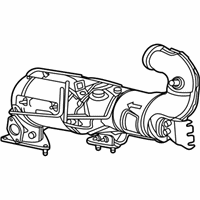 Product Specifications
Product Specifications- Other Names: Diesel Particulate Filter
- Replaced by: 40009139
- Part Description: Diesel Particulate Filter
$759.66 MSRP:$1133.13You Save: $373.47 (33%)OEM (Genuine) Converter Shield
PartNumber: 12709334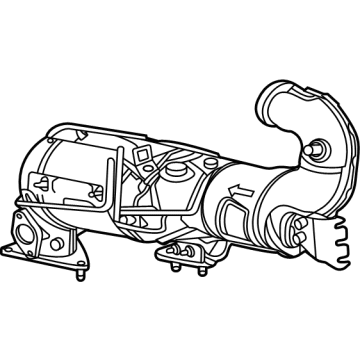 Product Specifications
Product Specifications- Fitment Type: Direct Replacement
- Replaced by: 40009139
- Part Description: Converter Shield
$759.66 MSRP:$1133.13You Save: $373.47 (33%)OEM (Genuine) Diesel Particulate Filter
PartNumber: 40009139 Product Specifications
Product Specifications- Other Names: Catalytic Converter, Diesel Particulate Filter
- Replaces: 12698485, 40009042, 12694479, 12696443, 12700216, 12709334
- Part Description: Diesel Particulate Filter
$759.66 MSRP:$1133.13You Save: $373.47 (33%)OEM (Genuine) Diesel Particulate Filter
PartNumber: 84341170 Product Specifications
Product Specifications- Other Names: Diesel Particulate Filter
- Item Dimensions: 160.2 x 45.5 x 36.7 inches
- Item Weight: 84.00 Pounds
- Replaced by: 86534430
- Part Description: Diesel Particulate Filter
$962.85 MSRP:$1440.40You Save: $477.55 (34%)OEM (Genuine) Diesel Particulate Filter
PartNumber: 84612878 Product Specifications
Product Specifications- Other Names: Diesel Particulate Filter
- Item Weight: 80.30 Pounds
- Fitment Type: Direct Replacement
- Replaced by: 86534430
- Part Description: Diesel Particulate Filter
$962.85 MSRP:$1440.40You Save: $477.55 (34%)OEM (Genuine) Muffler & Pipe
PartNumber: 84572772 Product Specifications
Product Specifications- Other Names: Diesel Particulate Filter, Muffler & Pipe
- Item Dimensions: 163.2 x 45.5 x 37.1 inches
- Item Weight: 70.70 Pounds
- Fitment Type: Direct Replacement
- Replaced by: 86534424
- Part Description: Muffler & Pipe
$1103.89 MSRP:$1653.13You Save: $549.24 (34%)OEM (Genuine) Diesel Particulate Filter
PartNumber: 84341174 Product Specifications
Product Specifications- Other Names: Diesel Particulate Filter
- Fitment Type: Direct Replacement
- Replaced by: 86534428
- Part Description: Diesel Particulate Filter
$934.31 MSRP:$1397.35You Save: $463.04 (34%)OEM (Genuine) Diesel Particulate Filter
PartNumber: 84341169 Product Specifications
Product Specifications- Other Names: Diesel Particulate Filter
- Replaced by: 86534432
- Part Description: Diesel Particulate Filter
$958.81 MSRP:$1434.30You Save: $475.49 (34%)OEM (Genuine) Diesel Particulate Filter
PartNumber: 84612876 Product Specifications
Product Specifications- Other Names: Diesel Particulate Filter
- Fitment Type: Direct Replacement
- Replaced by: 86534432
- Part Description: Diesel Particulate Filter
$958.81 MSRP:$1434.30You Save: $475.49 (34%)OEM (Genuine) Diesel Particulate Filter
PartNumber: 84341179 Product Specifications
Product Specifications- Other Names: Diesel Particulate Filter
- Item Dimensions: 157.1 x 47.3 x 37.4 inches
- Item Weight: 76.00 Pounds
- Replaced by: 86534453
- Part Description: Diesel Particulate Filter
$842.76 MSRP:$1259.26You Save: $416.50 (34%)
About Diesel Particulate Filter
The diesel particulate filter is important to the diesel engine because it removes any contaminants from exhaust gases. Additional benefits are that it enhances the vehicle's fuel economy and reduces emission levels.
Diesel filter historyDiesel particulate filtering was first introduced in the 1970s due to the rising concerns of inhaled particulates. They were mainly used on non-road machines and automobiles. The filter was created due to the rule to cap emissions on diesel vehicles.
Mode of actionThe wall-flow diesel filters remove about 85% of the soot, while in some cases they can remove close to 100%. Certain filters are only good for single-use and intended for disposal, while others are made to burn off the particulate that has gathered. More modern diesel engines in combination vehicles execute a feature called parked regeneration, where the engine increases the RPM and the temperature of the exhaust.
The diesel engine generates a lot of particles during the combustion process due to the fuel/air mix and the incomplete combustion. The configuration of the particles depends on the engine type and emission specification the engine is supposed to require.
Common issues with a diesel particulate filterA faulty diesel particulate filter can lead to a loss of engine performance and poor fuel economy which will cause the vehicle to stall.


